It's official, Greenberg installed
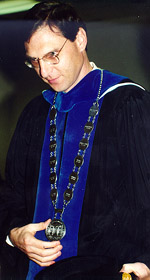 Dr.
Greenberg shows off the presidential medallion following his official installation
as president. Cast on the front face of the medallion is the facade of
the original Medical College of South Carolina Building. Above the medallion
is a banner inscribed with the president’s name. The smaller medallions
on one side of the necklace are inscribed with the names of the colleges
that make up MUSC. The medallions on the other side display the names of
MUSC’s former presidents and their years of tenure.
Dr.
Greenberg shows off the presidential medallion following his official installation
as president. Cast on the front face of the medallion is the facade of
the original Medical College of South Carolina Building. Above the medallion
is a banner inscribed with the president’s name. The smaller medallions
on one side of the necklace are inscribed with the names of the colleges
that make up MUSC. The medallions on the other side display the names of
MUSC’s former presidents and their years of tenure.
 A
cake five-feet in diameter showing the front face of the presidential medallion
was a highlight of the “MUSC Family” Party. The six smaller cakes surrounding
the center cake represent each of MUSC’s six colleges. A representative
from each college was selected to cut the first slice of each cake during
the celebration.
A
cake five-feet in diameter showing the front face of the presidential medallion
was a highlight of the “MUSC Family” Party. The six smaller cakes surrounding
the center cake represent each of MUSC’s six colleges. A representative
from each college was selected to cut the first slice of each cake during
the celebration.
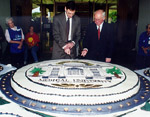 Dr.
Greenberg and Dr. Thomas Rowland, chairman of the MUSC Board of Trustees,
cut the first slice of the ultimate celebration cake at the “MUSC Family”
Party.
Dr.
Greenberg and Dr. Thomas Rowland, chairman of the MUSC Board of Trustees,
cut the first slice of the ultimate celebration cake at the “MUSC Family”
Party.
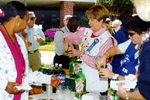 Volunteers
serve up punch, cookies and other goodies at the “MUSC Family” Party.
Volunteers
serve up punch, cookies and other goodies at the “MUSC Family” Party.
 A
marquis at The Riviera congratulates MUSC’s new president.
A
marquis at The Riviera congratulates MUSC’s new president.
 A
crowd gathered in the Horseshoe to hear representatives from the student
body, staff and faculty offer greetings to Dr. Greenberg, and to hear remarks
from the new president.
A
crowd gathered in the Horseshoe to hear representatives from the student
body, staff and faculty offer greetings to Dr. Greenberg, and to hear remarks
from the new president.
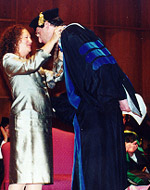 Mrs.
Leah Greenberg places the presidential medallion around Dr. Greenberg’s
neck during the Installation ceremony.
Mrs.
Leah Greenberg places the presidential medallion around Dr. Greenberg’s
neck during the Installation ceremony.
 Projects
from the Healthy South Carolina Initiative were highlighted during a Poster
Session in the Administration Building.
Projects
from the Healthy South Carolina Initiative were highlighted during a Poster
Session in the Administration Building.
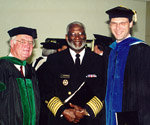 Dr.
Satcher poses with Dr. Rowland and Dr. Greenberg before the Installation.
Dr.
Satcher poses with Dr. Rowland and Dr. Greenberg before the Installation.
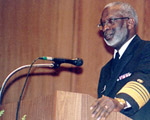 Assistant
Secretary for Health and U.S. Surgeon General Dr. David Satcher served
as the keynote speaker for the Installation ceremony.
Assistant
Secretary for Health and U.S. Surgeon General Dr. David Satcher served
as the keynote speaker for the Installation ceremony.
 During
the Inaugural Symposium, nationally-known speakers from the Centers for
Disease Control and Prevention, the National Institutes of Health, Howard
University and the University of South Carolina discussed diseases adversely
affecting many underserved South Carolinians.
During
the Inaugural Symposium, nationally-known speakers from the Centers for
Disease Control and Prevention, the National Institutes of Health, Howard
University and the University of South Carolina discussed diseases adversely
affecting many underserved South Carolinians.